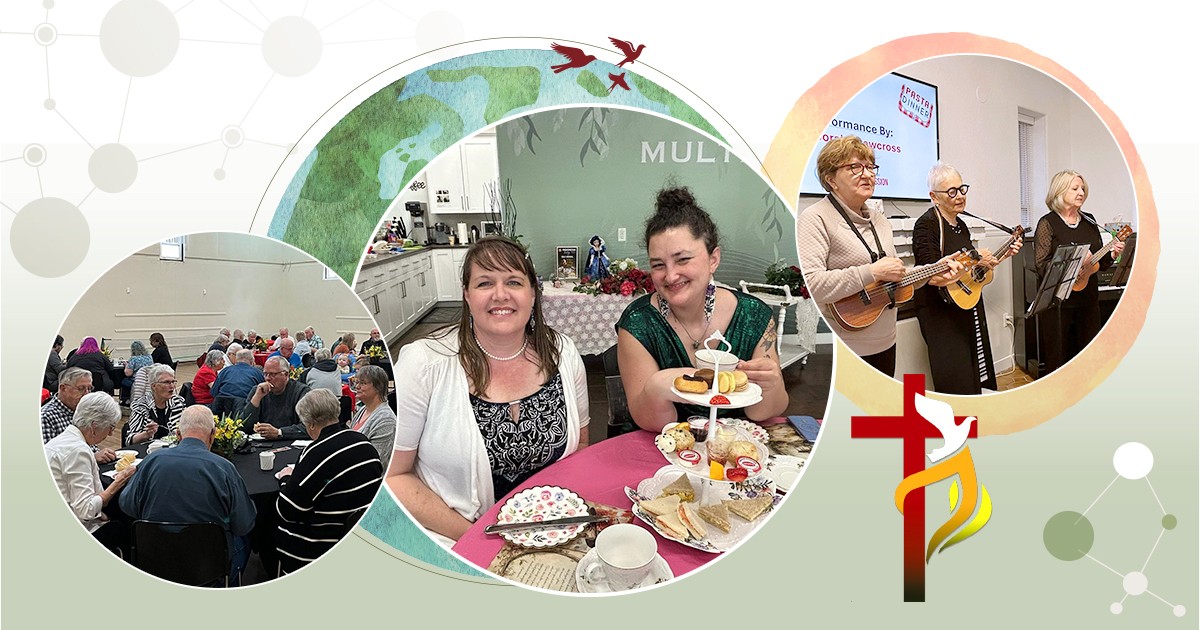As I was growing up in The Salvation Army, one discipleship activity made an impression on me. We were to get to know a senior in the congregation and listen to their advice for a young Christian. I drew the name of a gentleman who, in my teenage opinion, was cantankerous, even critical, about the teens in our church. In hindsight, he probably thought he drew the short straw with my name, too. But after spending an hour with him, I was surprised to discover how much he cared about the well-being of the youth in our church, and my perception took a 180-degree turn. It was the beginning of weekly check-ins, and it started with a conversation.
Over the past ten months, we have heard from more than 550 young adults—millennials and older generation Zs—about their preferred future in The Salvation Army. From the beginning, I became keenly aware of the many myths people hold about them. There’s no shortage of memes characterizing them as lazy, selfish, uncommitted, even spiritually shallow. But this couldn’t be further from the truth. I met people from all over the territory who love Jesus, seek justice and hope for a church where everyone can find a place to belong, regardless of who they are. I met leaders who are looking for an opportunity to lead and want to offer their voices to The Salvation Army in hopes of stemming the tide as this generation leaves the church at alarming rates.
We listened, and many felt heard, so where do we go from here? The working group, made up of millennial leaders in this territory, recommended we begin a conversation with territorial and divisional leaders and, maybe more importantly, with local churches. Although this generation was vocal about the impact some of our Army traditions have had on their experience at the local level, it was clear they didn’t believe there was any intent to drive them out. I believe one of the problems is that people don’t know what they don’t know. Instead of everyone feeling like they have drawn the short straw, it is time for a conversation, whether in person or virtually, to talk about the experience of this generation when it comes to The Salvation Army. I’m not naive enough to think that one conversation will solve everything, but it is a good place to start. If we’re listening, we will have to make choices about how the Army will move forward, and the steps we will take to get there.
Territorial leadership is considering these next steps, and Major Stephen Wiseman, who takes up the role of millennial project officer on July 2, will begin implementing the recommendations we heard from the voices of the generation we so desperately hope to reach and retain. In the coming weeks and months, you may see invitations on social media to join millennial leaders in a discipline called “3 Practice Circles.” This is a platform for listening to each other in a way that fosters curiosity and respect, where participants commit to remaining in the room despite our differences. The purpose is to connect on issues that are important to our world and to discover the perspectives of others.
Lt-Colonel David Kelly, an officer in the U.S.A. Eastern Territory, encourages us to consider the future in our approach. “It is about needing to adopt a less defensive posture toward these young leaders with their ideas and passions and listen carefully, not just to what they are saying, but to what God might be saying through them.” The Salvation Army was born as William and Catherine Booth spoke to a church that had left the poor of East London outside their doors. When the church didn’t listen, the Booths left to begin our movement, a place of welcome and belonging, regardless of social status. It’s time for us to listen again to the voices calling us back to a place where our communities can belong. Consider inviting your millennial and gen-Z leaders into a conversation or accepting their invitation to sit down and talk. It is amazing what a simple conversation can start as we listen to what God may be saying to The Salvation Army through them.
Over the past ten months, we have heard from more than 550 young adults—millennials and older generation Zs—about their preferred future in The Salvation Army. From the beginning, I became keenly aware of the many myths people hold about them. There’s no shortage of memes characterizing them as lazy, selfish, uncommitted, even spiritually shallow. But this couldn’t be further from the truth. I met people from all over the territory who love Jesus, seek justice and hope for a church where everyone can find a place to belong, regardless of who they are. I met leaders who are looking for an opportunity to lead and want to offer their voices to The Salvation Army in hopes of stemming the tide as this generation leaves the church at alarming rates.
We listened, and many felt heard, so where do we go from here? The working group, made up of millennial leaders in this territory, recommended we begin a conversation with territorial and divisional leaders and, maybe more importantly, with local churches. Although this generation was vocal about the impact some of our Army traditions have had on their experience at the local level, it was clear they didn’t believe there was any intent to drive them out. I believe one of the problems is that people don’t know what they don’t know. Instead of everyone feeling like they have drawn the short straw, it is time for a conversation, whether in person or virtually, to talk about the experience of this generation when it comes to The Salvation Army. I’m not naive enough to think that one conversation will solve everything, but it is a good place to start. If we’re listening, we will have to make choices about how the Army will move forward, and the steps we will take to get there.
Territorial leadership is considering these next steps, and Major Stephen Wiseman, who takes up the role of millennial project officer on July 2, will begin implementing the recommendations we heard from the voices of the generation we so desperately hope to reach and retain. In the coming weeks and months, you may see invitations on social media to join millennial leaders in a discipline called “3 Practice Circles.” This is a platform for listening to each other in a way that fosters curiosity and respect, where participants commit to remaining in the room despite our differences. The purpose is to connect on issues that are important to our world and to discover the perspectives of others.
Lt-Colonel David Kelly, an officer in the U.S.A. Eastern Territory, encourages us to consider the future in our approach. “It is about needing to adopt a less defensive posture toward these young leaders with their ideas and passions and listen carefully, not just to what they are saying, but to what God might be saying through them.” The Salvation Army was born as William and Catherine Booth spoke to a church that had left the poor of East London outside their doors. When the church didn’t listen, the Booths left to begin our movement, a place of welcome and belonging, regardless of social status. It’s time for us to listen again to the voices calling us back to a place where our communities can belong. Consider inviting your millennial and gen-Z leaders into a conversation or accepting their invitation to sit down and talk. It is amazing what a simple conversation can start as we listen to what God may be saying to The Salvation Army through them.
This story is from:










Leave a Comment